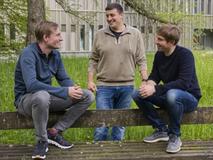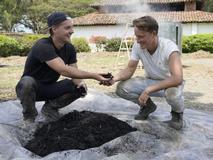Startups developing AI-based nutritional tracking, decarbonized amonia production, a technology to uncover underground corrosion, restoration of soil health, and painless delivery of injectable drugs each win CHF 10,000
27.07.2023
AlpineWell, plasNifix, TALPA inspection, Terra Preta, and Transire Bio win Venture Kick's second stage of financial and entrepreneurial support. Their projects include an AI-driven food tracker for accurate dietary monitoring and a range of nutritionally complete meal supplements; aim to revolutionize ammonia production; locate corrosion damage in buried engineering structures; remove carbon and restore soil health through decentralized biochar production; and enable the painless delivery of injectable drugs.
 |
 AlpineWell: left, CSO Gommaar D'Hulst, and right, CEO Robert Schreiber
|
 plasNifix, from left to right: CEO Martin Poms, CTO Johannes Grünwald, and CFO Martin Trummer
|
 TALPA Inspection: Dr._Patrick Pfändler, Dr._Federico Orlando-Martinelli, and Lukas Bircher
|
 Terra Preta: from left to right, CEO Thomas Käslin and CPO Lorenz Buser
|
 Transire Bio: CEO Dr. Nevena Paunovic and CSO David Klein Cerrejon
|
AlpineWell: AI-powered Nutritional Tracking & Advanced Supplements for Elderly
A large proportion of elderly individuals face malnutrition due to reduced appetite, difficulties in swallowing and inaccurate food tracking. This culminates into to frailty, muscle loss and increased healthcare expenditure.
AlpineWell is founded by a multidisciplinary team of researchers from ETH Zurich: Jotam Bergfreund, food engineer, Raban Iten, expert in machine learning, Gommaar D'Hulst, health scientist, and Robert Schreiber, neuroscientist and business strategist. Their innovation includes an AI-driven food tracker for accurate dietary monitoring and a range of nutritionally complete meal supplements. Their target market encompasses the burgeoning elderly population worldwide, which is expected to double by 2050.
With Venture Kick's support, they will strategically focus on client acquisition, specifically targeting hospitals and elderly homes. These funds will also facilitate the procurement of raw materials essential for supplement prototyping. Lastly, a portion of the funding will be utilized to enhance their AI food tracker's capabilities through advanced cloud computing solutions, improving its efficiency and accuracy.
plasNifix: Decarbonizing ammonia production
Ammonia, a vital resource for nitrogen fertilizers, plays a crucial role in global food production. Yet, its environmental impact is concerning, contributing 2% of global energy consumption and 1.3% of CO2 emissions.
To tackle this issue, Johannes Grünwald, Martin Poms, and Martin Trummer founded plasNifix, aiming to revolutionize ammonia production. Their innovative plasma-assisted synthesis with gaseous catalysts could potentially cut Haber-Bosch's energy consumption in half and run entirely on renewable energy, achieving CO2 neutrality. This eco-friendly approach allows decentralized ammonia production directly at the end user, catering to a market valued at $125-130 billion by 2030.
To realize their vision, the first round of Venturekick funding will be utilized for prototype enhancements, covering legal fees associated with financial, intellectual property, and patent rights, as well as networking expenses.
TALPA Inspection - Uncovering corrosion in the underground
The reliable inspection of buried reinforced concrete structures has not been economically feasible until now. There is still a lack of efficient, non-destructive inspection methods to reliably detect corrosion damage in the underground. In the case of cantilever retaining walls, this lack of inspection capability is currently particularly acute.
At ETH Zurich, the TALPA Inspection team has developed an innovative technology based on electrochemical techniques to locate corrosion damage in buried engineering structures made of reinforced concrete (RC). Their new inspection method can use existing pipes (e.g. drainage pipes by retaining walls) to inspect critical areas of existing structures. Furthermore, the miniaturization potential of the technology is significant, so that boreholes can be used, or small tubes can easily be integrated into new constructions/renovations to enable periodic SoA inspections over the entire service life. TALPA Inspection estimates the global market potential of up to CHF 25 billion per year for the inspection of RC structures.
The Venture Kick funds will help them to build customer contacts, improve their social media and webpage presence, and move on to the verification of the technology in pilot projects in collaboration with infrastructure owners such as ASTRA/FEDRO.
Terra Preta: Remove carbon and restore soil health through decentralized biochar production
Agricultural value chains face dual threats: degrading soils & changing climate. Whereas agricultural production is responsible for about 17% of global emissions. Urgent action is needed by corporates to reach their net-zero targets and to improve climate resilience and adaptation of their farmers and their supply chains.
Terra Preta's team, with expertise in carbon markets and sustainability consulting, as well as in B2B sales and product management, has recently been strengthened by adding team members with strong knowledge in mechanical engineering and data sciences. Their innovation includes a cost-effective and clean pyrolysis reactor to transform agricultural residues into biochar, complemented by our digital monitoring system for high-quality carbon removal credits generation. Terra Preta’s approach decarbonizes agricultural value chains and enhances the climate resilience of the supply chain whilst helping farmers adapt and improve their margins. All while generating carbon removal credits for the rapidly growing voluntary carbon market, which is projected to reach USD 10-40 billion by 2030.
The Venture Kick Stage 1 funds will allow them to expand their sales efforts and further develop their hardware and software technology.
Transire Bio: Enabling the painless delivery of injectable drugs
Each day, millions of patients have to administer their medicines through painful injections. Many drugs cannot indeed be taken orally and have to be injected because they are sensitive to degradation and/or too large to cross the gut.
Transire Bio is an ETH spin-off that takes needles out of the picture and offers a painless alternative for the delivery of these medicines. The technology is based on an octopus-inspired suction patch that patients place on the inner side of the cheek, enabling the drug to efficiently reach the bloodstream. The team comprises Dr. Nevena Paunoviç (CEO) and David Klein Cerrejon (CSO), Prof. Jean-Christophe Leroux, and Prof. Zhi Luo (advisory board). With their OctoPatchTM, they aim to target a rapidly growing market of therapeutic peptides worth ca. CHF 40 billion.
The Venture Kick Stage 1 funds will allow them to validate their regulatory strategy through discussions with regulatory experts and further prepare for the fundraising.
A large proportion of elderly individuals face malnutrition due to reduced appetite, difficulties in swallowing and inaccurate food tracking. This culminates into to frailty, muscle loss and increased healthcare expenditure.
AlpineWell is founded by a multidisciplinary team of researchers from ETH Zurich: Jotam Bergfreund, food engineer, Raban Iten, expert in machine learning, Gommaar D'Hulst, health scientist, and Robert Schreiber, neuroscientist and business strategist. Their innovation includes an AI-driven food tracker for accurate dietary monitoring and a range of nutritionally complete meal supplements. Their target market encompasses the burgeoning elderly population worldwide, which is expected to double by 2050.
With Venture Kick's support, they will strategically focus on client acquisition, specifically targeting hospitals and elderly homes. These funds will also facilitate the procurement of raw materials essential for supplement prototyping. Lastly, a portion of the funding will be utilized to enhance their AI food tracker's capabilities through advanced cloud computing solutions, improving its efficiency and accuracy.
plasNifix: Decarbonizing ammonia production
Ammonia, a vital resource for nitrogen fertilizers, plays a crucial role in global food production. Yet, its environmental impact is concerning, contributing 2% of global energy consumption and 1.3% of CO2 emissions.
To tackle this issue, Johannes Grünwald, Martin Poms, and Martin Trummer founded plasNifix, aiming to revolutionize ammonia production. Their innovative plasma-assisted synthesis with gaseous catalysts could potentially cut Haber-Bosch's energy consumption in half and run entirely on renewable energy, achieving CO2 neutrality. This eco-friendly approach allows decentralized ammonia production directly at the end user, catering to a market valued at $125-130 billion by 2030.
To realize their vision, the first round of Venturekick funding will be utilized for prototype enhancements, covering legal fees associated with financial, intellectual property, and patent rights, as well as networking expenses.
TALPA Inspection - Uncovering corrosion in the underground
The reliable inspection of buried reinforced concrete structures has not been economically feasible until now. There is still a lack of efficient, non-destructive inspection methods to reliably detect corrosion damage in the underground. In the case of cantilever retaining walls, this lack of inspection capability is currently particularly acute.
At ETH Zurich, the TALPA Inspection team has developed an innovative technology based on electrochemical techniques to locate corrosion damage in buried engineering structures made of reinforced concrete (RC). Their new inspection method can use existing pipes (e.g. drainage pipes by retaining walls) to inspect critical areas of existing structures. Furthermore, the miniaturization potential of the technology is significant, so that boreholes can be used, or small tubes can easily be integrated into new constructions/renovations to enable periodic SoA inspections over the entire service life. TALPA Inspection estimates the global market potential of up to CHF 25 billion per year for the inspection of RC structures.
The Venture Kick funds will help them to build customer contacts, improve their social media and webpage presence, and move on to the verification of the technology in pilot projects in collaboration with infrastructure owners such as ASTRA/FEDRO.
Terra Preta: Remove carbon and restore soil health through decentralized biochar production
Agricultural value chains face dual threats: degrading soils & changing climate. Whereas agricultural production is responsible for about 17% of global emissions. Urgent action is needed by corporates to reach their net-zero targets and to improve climate resilience and adaptation of their farmers and their supply chains.
Terra Preta's team, with expertise in carbon markets and sustainability consulting, as well as in B2B sales and product management, has recently been strengthened by adding team members with strong knowledge in mechanical engineering and data sciences. Their innovation includes a cost-effective and clean pyrolysis reactor to transform agricultural residues into biochar, complemented by our digital monitoring system for high-quality carbon removal credits generation. Terra Preta’s approach decarbonizes agricultural value chains and enhances the climate resilience of the supply chain whilst helping farmers adapt and improve their margins. All while generating carbon removal credits for the rapidly growing voluntary carbon market, which is projected to reach USD 10-40 billion by 2030.
The Venture Kick Stage 1 funds will allow them to expand their sales efforts and further develop their hardware and software technology.
Transire Bio: Enabling the painless delivery of injectable drugs
Each day, millions of patients have to administer their medicines through painful injections. Many drugs cannot indeed be taken orally and have to be injected because they are sensitive to degradation and/or too large to cross the gut.
Transire Bio is an ETH spin-off that takes needles out of the picture and offers a painless alternative for the delivery of these medicines. The technology is based on an octopus-inspired suction patch that patients place on the inner side of the cheek, enabling the drug to efficiently reach the bloodstream. The team comprises Dr. Nevena Paunoviç (CEO) and David Klein Cerrejon (CSO), Prof. Jean-Christophe Leroux, and Prof. Zhi Luo (advisory board). With their OctoPatchTM, they aim to target a rapidly growing market of therapeutic peptides worth ca. CHF 40 billion.
The Venture Kick Stage 1 funds will allow them to validate their regulatory strategy through discussions with regulatory experts and further prepare for the fundraising.


